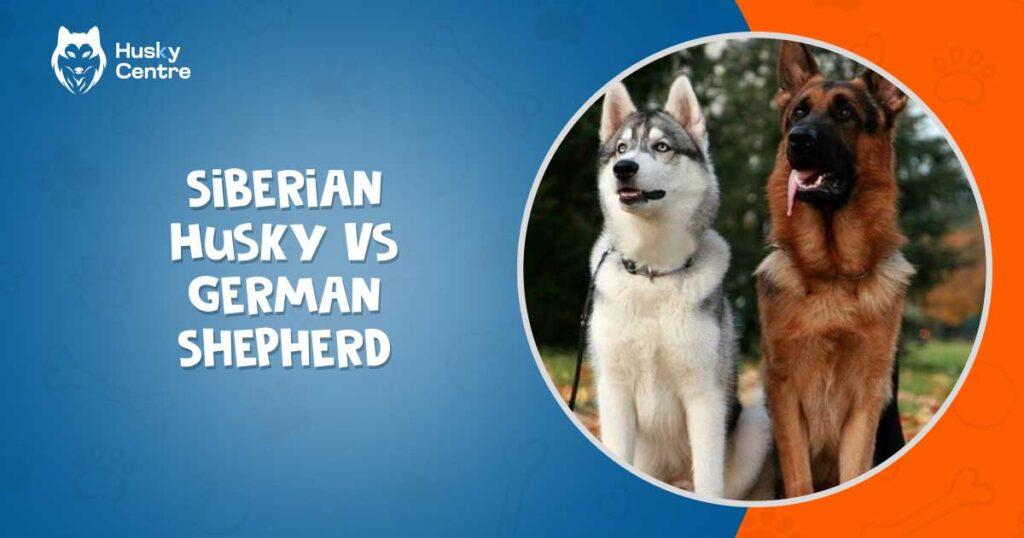Siberian Huskies are known for their endurance and friendly nature. German Shepherds excel in intelligence, loyalty, and versatility.
Siberian Huskies and German Shepherds are both highly popular dog breeds, each with unique traits and characteristics. Huskies are medium-sized, energetic dogs known for their thick fur and striking blue eyes. German Shepherds are larger, strong, and highly trainable, often used in police and military roles.
Both breeds are active and require regular exercise. Huskies are more independent and friendly with strangers, while German Shepherds are loyal and protective. Each breed is suitable for different lifestyles and needs, making them unique companions.
Temperament Comparison
Siberian Huskies and German Shepherds are two popular dog breeds known for their distinctive temperaments. Understanding the temperament of each breed helps potential dog owners decide which pet fits their lifestyle. This article delves into the temperament comparison of these two breeds, highlighting differences in loyalty, protectiveness, trainability, social behavior, and adaptability to families and children.
Differences In Loyalty And Protectiveness
When comparing dog breeds, loyalty and protectiveness are key traits. German Shepherds are exceptionally loyal and protective of their families. They are often used in police and military roles due to their vigilance and dedication. German shepherds bond closely with their owners, showing unwavering loyalty.
Husky temperament differs significantly. Siberian Huskies are friendly and outgoing but not as protective. They were bred to work in packs and have an independent streak. Huskies are less likely to act as guard dogs compared to German Shepherds.
| Trait | German Shepherd | Siberian Husky |
|---|---|---|
| Loyalty | High | Moderate |
| Protectiveness | High | Low |
Trainability And Social Behavior
Trainability is another important factor in the husky vs shepherd personality. German Shepherds are highly trainable and intelligent. They excel in obedience training and can learn complex tasks. Their eagerness to please makes them ideal for various roles, including service and therapy work.
Husky temperament shows more independence. Training a Husky can be challenging due to their stubborn nature. They require consistent and patient training methods. Despite this, they are sociable and enjoy the company of other dogs and people.
- German Shepherds: Quick learners, excel in obedience.
- Siberian Huskies: Require patience, sociable but independent.
Adaptability To Families And Children
Both breeds have unique traits that affect their adaptability to families and children. German Shepherds are excellent family dogs, known for their protective nature and gentle demeanor around kids. They are reliable and can be trusted to watch over children.
Siberian Huskies are also good with families but have a more playful and energetic side. They require plenty of exercise and mental stimulation. Huskies enjoy playing with children but may be too boisterous for very young kids.
- German Shepherds: Protective, gentle with kids, reliable.
- Siberian Huskies: Playful, energetic, require exercise.
In conclusion, understanding the temperament differences between Siberian Huskies and German Shepherds can help you choose the perfect companion for your family and lifestyle.
Physical Traits And Exercise Needs
When comparing the Siberian Husky vs German Shepherd, their physical traits and exercise needs are key aspects to consider. Both breeds are known for their strength, energy, and unique grooming needs. Understanding these characteristics can help you decide which dog breed fits your lifestyle better.
Size And Strength Differences
The Siberian Husky and German Shepherd have noticeable differences in size and strength. The German Shepherd is typically larger and more muscular. This breed displays a robust and athletic build. Below is a table highlighting their size and strength differences:
| Trait | Siberian Husky | German Shepherd |
|---|---|---|
| Height | 20-23.5 inches | 22-26 inches |
| Weight | 35-60 pounds | 50-90 pounds |
| Build | Lean and agile | Strong and muscular |
German Shepherds have a more powerful build, making them excellent for roles like police work and protection. Siberian Huskies, on the other hand, are known for their endurance and agility. They were bred to pull sleds over long distances, showcasing their strength differently.
Energy Levels And Exercise Requirements
Both breeds are high-energy dogs requiring significant exercise. Exercise for large dogs like German Shepherds and Siberian Huskies is crucial for their health and happiness.
- Siberian Husky: Needs 1-2 hours of exercise daily. Activities can include running, hiking, and playing fetch.
- German Shepherd: Requires 1-2 hours of vigorous activity each day. They thrive on activities that challenge both their physical and mental capabilities.
German Shepherds excel in activities like obedience training, agility, and protection sports. Husky vs Shepherd physical traits influence their preferred exercise routines. Huskies enjoy long-distance running and pulling activities, reflecting their sled-pulling heritage. Both breeds benefit from a mix of physical and mental stimulation to prevent boredom and destructive behavior.
Grooming And Coat Maintenance
Both breeds have unique grooming needs. Husky grooming needs involve regular maintenance due to their thick double coat.
- Siberian Husky: Requires brushing 2-3 times a week. During shedding seasons, daily brushing is necessary to manage the fur.
- German Shepherd: Needs brushing 3-4 times a week. They also shed heavily, especially during spring and fall.
Both breeds benefit from regular baths, though not too frequently to avoid skin irritation. Grooming and coat maintenance for these breeds ensures their coats remain healthy and reduces shedding around the home.
Regular grooming helps detect any skin issues early, keeping your dog comfortable and healthy. For both breeds, investing in good grooming tools like de-shedding brushes and high-quality shampoos is beneficial.
Health And Lifespan Comparison
Choosing between a Siberian Husky and a German Shepherd involves many considerations, one of the most important being their health and lifespan. Understanding the health challenges and life expectancy of each breed can help prospective dog owners make an informed decision. Let’s delve into the health and lifespan comparison of these two popular breeds.
Common Health Issues For Each Breed
Both the Siberian Husky and the German Shepherd have unique health profiles. Recognizing common health issues in each breed is essential for effective dog breed health comparison.
Siberian Huskies are generally healthy dogs but can be prone to:
- Hip Dysplasia: A genetic condition that affects the hip joint.
- Eye Conditions: Cataracts, corneal dystrophy, and progressive retinal atrophy (PRA).
- Hypothyroidism: A disorder of the thyroid gland.
German Shepherds are also susceptible to several health issues, including:
- Hip and Elbow Dysplasia: Common in large breeds, affecting joints.
- Degenerative Myelopathy: A spinal cord disease.
- Gastric Dilatation-Volvulus (Bloat): A life-threatening stomach condition.
Average Lifespan And Veterinary Needs
Understanding the average lifespan and veterinary needs of each breed is crucial for evaluating the lifespan of large dogs.
Siberian Huskies have an average lifespan of 12 to 14 years. Their veterinary needs include:
- Regular check-ups to monitor hip and eye health.
- Annual thyroid function tests.
- Consistent vaccination schedules and parasite prevention.
German Shepherds typically live between 9 to 13 years. Their veterinary care often involves:
- Frequent joint health evaluations.
- Screenings for degenerative myelopathy.
- Monitoring for signs of bloat and maintaining a proper diet.
Both breeds benefit from routine vet visits and preventive care to address potential health issues early.
Overall Care And Maintenance
Effective dog breed care involves understanding the overall care and maintenance needs of each breed.
Siberian Huskies require:
- Regular exercise, including long walks and playtime.
- Weekly grooming to manage shedding and maintain coat health.
- A balanced diet to support their active lifestyle.
German Shepherds need:
- Daily physical activity and mental stimulation.
- Routine grooming, especially during shedding seasons.
- High-quality nutrition to support joint health.
Both breeds thrive with proper care and attention, ensuring a happy and healthy life for your furry friend.
Frequently Asked Questions
Which Is Better: Husky Or German Shepherd?
The better breed depends on your lifestyle. Huskies are energetic and playful. German Shepherds are loyal and protective. Both are great choices.
Are German Shepherds Smarter Than Huskies?
German Shepherds are generally considered more trainable. They excel in tasks and obedience. Huskies are intelligent but can be independent.
Do Huskies Shed More Than German Shepherds?
Yes, Huskies shed more, especially during their seasonal shedding periods. Regular grooming helps manage their fur.
Are German Shepherds More Protective Than Huskies?
Yes, German Shepherds are known for their protective nature. They are often used as guard dogs and in police work.
Conclusion
Choosing between a Siberian Husky and a German Shepherd depends on your lifestyle. Both breeds have unique traits. Huskies are energetic and independent, while German Shepherds are loyal and protective. Consider your needs and environment before making a decision. Either breed can bring joy and companionship to your life.


Meet Jarred, the heart and soul behind HukyCentre. With a deep affection for furry friends, he pours his passion into every word he writes. His genuine love for dogs shines through in his engaging and informative content. As a dedicated dog enthusiast, Jarred’s goal is to share valuable insights and tips that resonate with fellow dog lovers. Join Jarred on the journey as he celebrates the joy and companionship that dogs bring into our lives.



